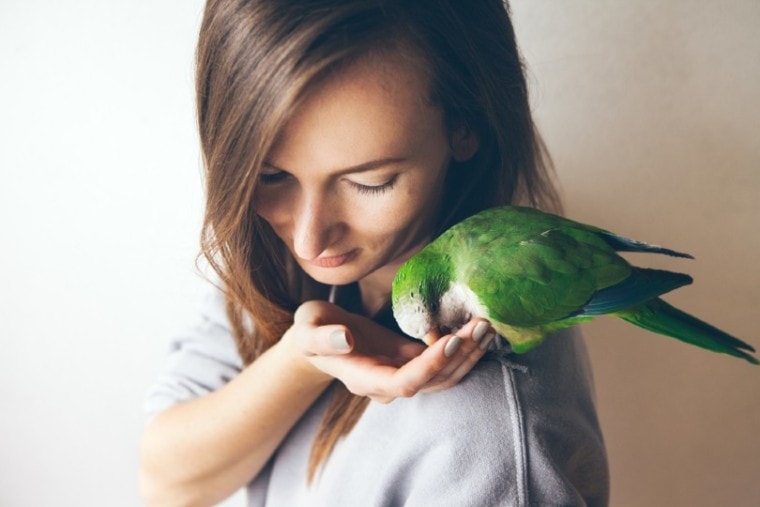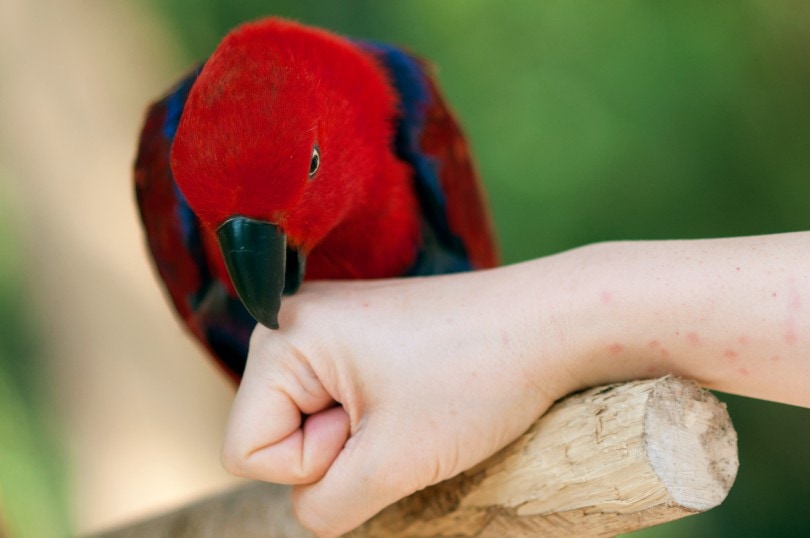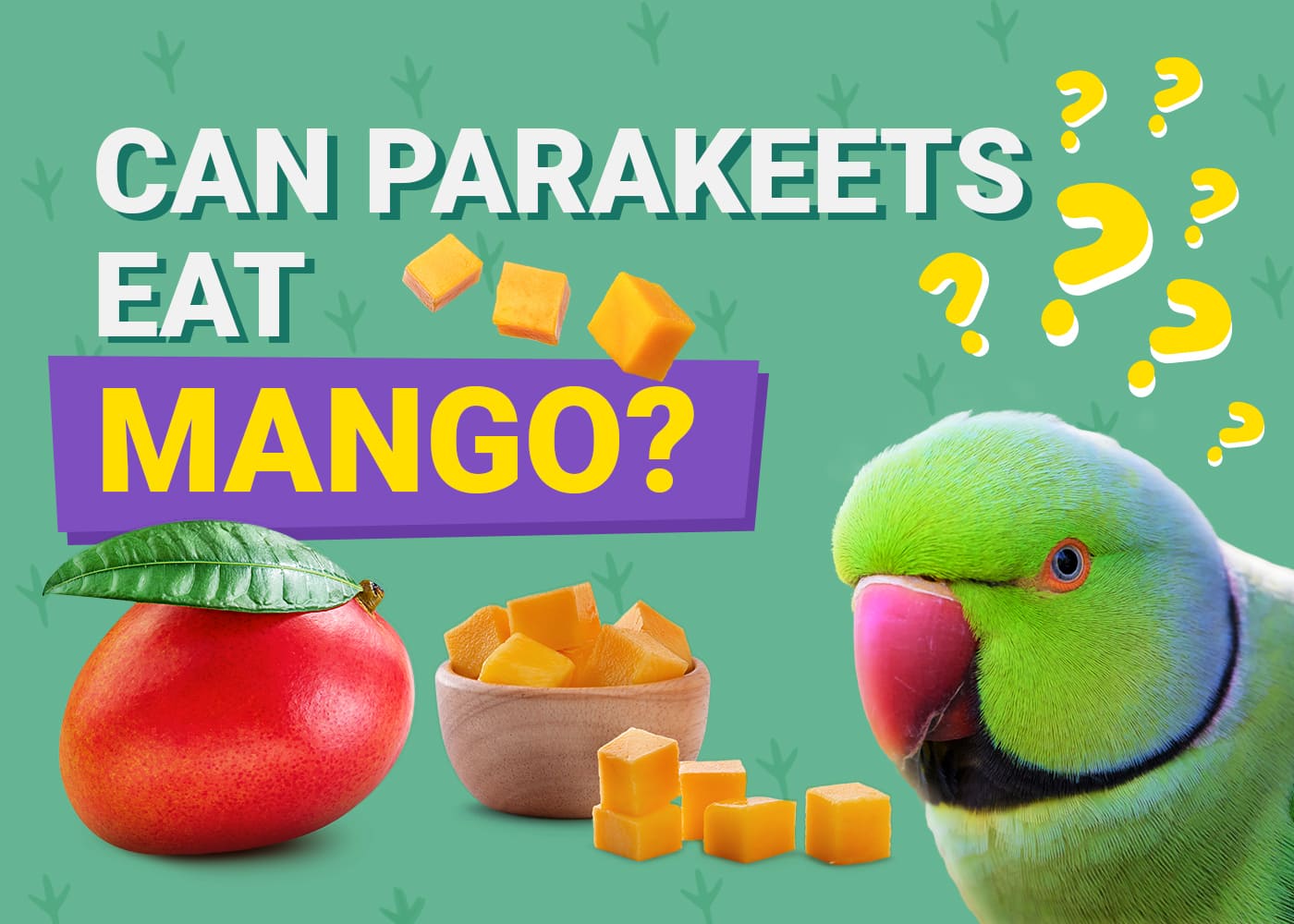
From Parrotlets to Macaws, Parrots can vary greatly in size, color, and, indeed, temperament. Even within the same species, two birds can be very different. This means that while one parrot might like nothing more than a good head scratch, another parrot even of the same species may prefer you to be hands-off. Generally, well-socialized parrots that have been handled and petted from a young age are more receptive to petting.
While it does depend on the individual bird, there are certain spots where a parrot is more likely to enjoy being petted. The head, back of the neck, beak, and feet are their favorite spots. In any case, always ensure that you pet respectfully and carefully. And if a parrot is having a day when it doesn’t want to be touched, don’t push it. Give it some space and try again another day.
Petting Parrots
Usually, well-socialized parrots enjoy being petted. It can be reminiscent of grooming that would normally be performed by other parrots. Because a pet parrot treats their humans as part of their flock, they normally welcome petting.
Some will need to build up a level of trust with a person before they let them pet them, but some enjoy being petted by just about anybody willing. You do need to be gentle when petting and there are some areas to avoid, as well as areas that are more likely to elicit a positive response.
What Spot To Pet a Parrot
Finding the right petting spot for a parrot will involve some trial and error. Try petting the back of a parrot’s neck, which is usually a preferred spot. If the parrot moves into your hand, this is a sign that they are enjoying it. If they approach you for more when you stop, this is another good sign.
Another area that parrots typically enjoy being petted is on the top of the head.. Some even enjoy having their beaks petted.

Where To Avoid
Parrots are prey animals. In the wild, they would use their ability to fly to get away from predators, and even pet parrots retain these instincts. In addition, stroking their wings or back can inadvertently stimulate mating behaviors in your parrot, because their sexual organs (also known as gonads) are located at the place just under their wings. Similarly, avoid the stomach, don’t stroke under the feathers, and avoid the tail.
Signs a Parrot Doesn’t Want to Be Petted
When attempting to pet a parrot, you should look for signs that it might not be enjoying the experience, as well as signs of enjoyment. If the parrot backs away, side steps, or otherwise tries to get away from your hand, it either means that it isn’t enjoying the particular treatment it’s getting or that it doesn’t trust you enough to let you pet it. In either case, you should respect the bird’s space and stop. Some parrots may tell you that they don’t like it with loud squawks, and others may show their disdain by flapping or beating their wings.
 Top 3 Parrot Petting Tips
Top 3 Parrot Petting Tips
Parrots have layered feathers, are preyed upon by bigger animals in the wild, and they do have sensitive areas on their bodies. This means that the parrot places a lot of trust in you when it allows you to pet them. Follow these steps to repay that trust and to encourage a more positive experience for you both.
1. Go Slow
Move your hand slowly and let the bird see what you are doing. You should move slowly so you don’t scare or startle the bird, who will likely be watching you very intently to try and ascertain your intentions.
2. Don’t Surprise Them
One of the reasons you need to move your hand slowly is so that you don’t scare or alarm the bird. Also prevent other movements that might cause alarm, such as moving your feet or bobbing your head. Always make sure the parrot can see your hand approaching.
3. Be Gentle
Birds, even Macaws and Black Palm Cockatoos are much smaller than humans, and they are very sensitive. If you squeeze too tight, rub too hard, or pet too vigorously, you could cause discomfort or even injury. Take it slowly and pet them gently to get the best results. In addition, you should use a calm, gentle voice when you’re interacting with your parrot.

Is It OK To Cuddle Your Parrot?
Generally speaking, birds don’t like to cuddle in the same way as cats, dogs, or humans. Your bird may bury their head in your armpit or elbow, but you should avoid cuddling your bird. They are relatively fragile and can be easily injured if you cuddle them too hard.
Is it OK To Kiss Your Parrot?
Kissing your bird may actually be bad for you and your bird. Parrot Fever is a disease that is caused by bacteria from birds. Experts also recommend washing your hands after handling birds. If you don’t know a parrot’s health status, it is best to avoid kissing them.

Final Thoughts
Parrots can be surprisingly affectionate, and they certainly enjoy spending time around their owners. In a lot of cases, this means that they also enjoy being petted by humans that they are close to, although most will need to build up some level of trust with a person before allowing them to pet them. If you are petting a Parrot, stick to areas like the head and the back of the neck and avoid the back, belly, and extremities, although some Parrots do like having their beaks petted.
Related Read:
- Why You Should Not Pet a Bird’s Wings: 4 Reasons & Useful Tips
- What Spots Do Cockatiels Like to Be Petted? (Guide with Infographic)
Featured Image Credit: Veera, Shutterstock



 Top 3 Parrot Petting Tips
Top 3 Parrot Petting Tips





